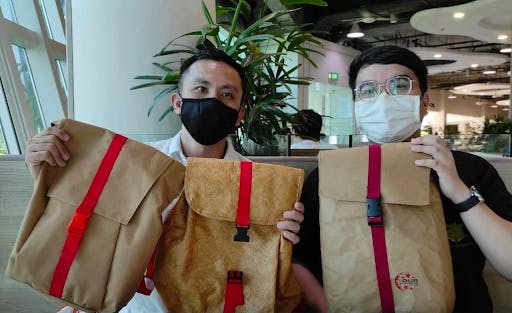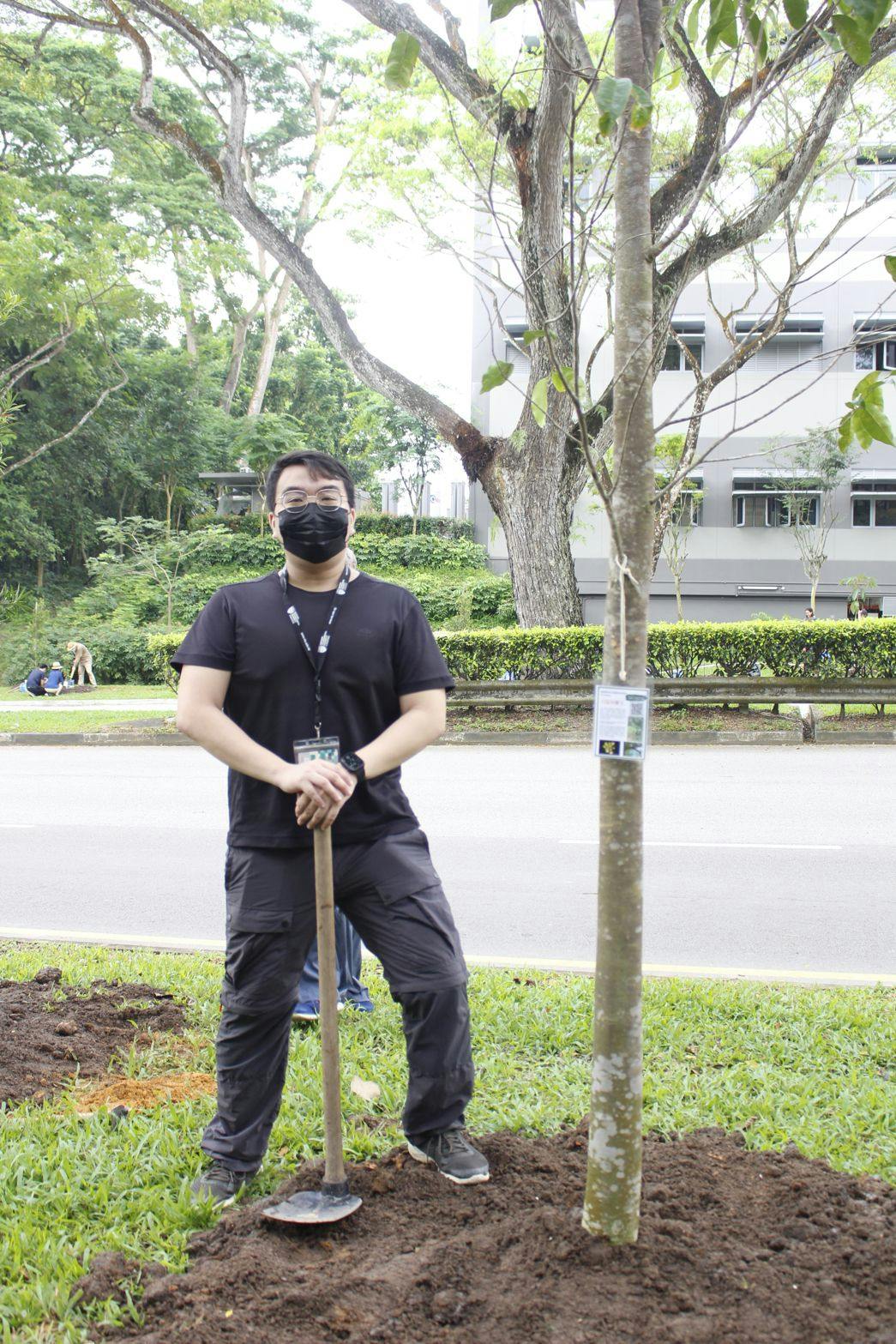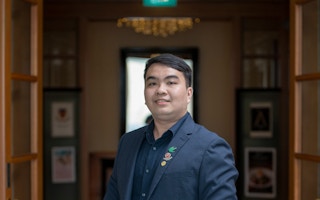Tan Shi Zhou, 26, is a wearer of many hats. While pursuing his undergraduate studies at Singapore’s Nanyang Technological University (NTU), he was also a global sustainability consultant at leading technology company Razer, and an active advocate in Singapore’s environmental scene.
To continue reading, subscribe to Eco‑Business.
There's something for everyone. We offer a range of subscription plans.
- Access our stories and receive our Insights Weekly newsletter with the free EB Member plan.
- Unlock unlimited access to our content and archive with EB Circle.
- Publish your content with EB Premium.
His sustainability journey began quite serendipitously when he watched a documentary screened on campus when he was 17 and doing a diploma in chemical engineering. His lecturer then encouraged their class to attend the movie screening to understand more about habitat loss and wildlife conservation.
“I recall that there were orangutans [in the documentary], and that I felt quite disturbed by how they were affected by deforestation,” Tan said. The impact of what he had seen pushed him to join the student-led campus green group that organised the event, and he became president of the club the following year.
Later, when he was doing an undergraduate degree in the School of Materials Science and Engineering at NTU, Singapore’s second-largest university, he joined and then helmed Earthlink, the tertiary institution’s environmental club, which is now more than 300 members strong.
Since his polytechnic days, through his national service stint and now at university, Tan has become a familiar face in Singapore’s environment advocacy scene. His work won him a spot on the Eco-Business Youth A-List Youth 2022, which recognises young changemakers in the sustainability scene in the region.
“
I personally feel that it is very important to communicate and engage with the institutions effectively, even if there exist conflicting intentions. A direct confrontation will only close all doors to a healthy and productive conversation, as well as the potential to shift mindsets and work towards a common goal.
Tan has volunteered in numerous environmental groups such as: the People’s Movement to Stop Haze (PM Haze), a non-profit focusing on outreach, research and advocacy on the transboundary haze; Plastic-Lite Singapore, a grassroots volunteer organisation that raises awareness about the dangers of an excessive dependence on single-use plastics; and the Jane Goodall Institute Singapore, which aims to empower and inspire young people to take action for the environment, animals and community.
He is a firm believer that student-led environmental clubs are crucial in making sustainability accessible to young people. “The balance is having a low enough barrier for youths that are new to sustainability to be able to learn, while allowing those who have more experience be able to push for larger, more impactful initiatives,” said Tan.
Tan talks to Eco-Business about how having a community of supportive, like-minded people is essential in helping youths to start their sustainability journey – and to continue walking the path.
What was a highlight for you in your sustainability work in 2022?
One of the important things that my team and I achieved was setting up the Inter-University Environmental Coalition – we gathered student leaders from the environmental clubs of Singapore’s universities [i.e. the National University of Singapore, Yale–NUS, NTU, the Singapore Institute of Technology, the Singapore Institute of Management and the Singapore University of Technology and Design].
We came together to amplify the youth voice and get student leaders to work with each other to advance important conversations about the environment, to engage with the public and private sectors, and to work together to enact change, in a conference that was the first of its kind in Singapore, held in October last year.
Planning for the conference started much earlier in March, and one of the biggest challenges for us was balancing between trying to organise the conference and managing schoolwork.
Tell us about more your journey in sustainability advocacy, after you watched the documentary that started you on this path.
When I was in the environmental club [back in Temasek Polytechnic], I was exposed to quite a wide range of topics. I then joined a number of non-governmental organisations like Plastic-Lite Singapore, PM Haze and the Jane Goodall Institute (Singapore), to advocate for different sustainability causes like plastic pollution, transboundary haze and wildlife conservation. I wanted to try different sustainability causes to see where I could contribute the best.
In 2020, I attended the Asian Climate Leadership Camp, where I met some other youths who were exploring the idea of coming together as Asian environmentalists to form a network to amplify the voices in the region. They realised that Asian environmentalists may not be as outspoken as our western counterparts, so sometimes our work may not be heard on a global stage. That’s why they decided to start the Asian Environmental Youth Network (AEYN).
I joined AEYN as outreach lead in 2021, to source for opportunities for outreach engagement for the organisation’s members.
In 2021, you were involved in producing a more sustainable National Day Parade fun pack. How did that come about?

Tan (right) with the NDP fun pack in 2021. Image: Tan Shi Zhou.
In December 2020, Member of Parliament Louis Chua got together some green groups to work together on how we could make the National Day Parade (NDP) greener. At the time, I was [volunteering] with Plastic-Lite Singapore and came in as a materials consultant [also because of my educational background in materials science].
The NDP executive committee shortlisted three different materials that could be used to make the fun pack with. We analysed the materials based on a few different criteria: the carbon emissions to make the material, the ease of recycling, durability, waterproofing and costs.
We eventually picked the one that was made with Type 2 plastic, because the recycling facilities for this type of plastic are more widely available than for the other options. Within all the criteria laid out by the NDP exco and the interests of the green groups, it was the best compromise.
It looks like kraft paper, but it is not – because of the waterproofing criteria, kraft paper would have to have a plastic coating, which would make it harder to recycle. The material we eventually chose was modelled after the brown paper that is used to tabao (take away in Chinese) chicken rice.
“
I hope that Singapore as a whole – people, public and private sectors – will put sustainability at the centre in our decision-making processes.
What are some of your biggest concerns as a young environmentalist?
I’m really interested in how we can get corporates to decarbonise. Since I joined Razer, I’ve been working on carbon solutions and carbon footprinting. What I’ve realised is that corporates have a key role to play in ensuring a more sustainable environment beyond the public sector.
The government has quite a number of fronts they are working on, but I feel that we could push for the energy transition at a faster rate. I am heartened to see that Singapore is in the process of adopting green hydrogen.
I’m personally not a big supporter of solar energy, even though I understand why Singapore does use it quite a bit. My concerns are largely related to how solar panels are manufactured – the way minerals and metals have to be extracted to make solar panels – and also that the conversion efficiency of solar is not very high at this point, around 20 per cent commercially and 30 per cent in labs. The end-of-life issues for solar panels is also something I am concerned about.
However, in the labs at NTU right now, some of the researchers are working on the third generation of solar panels that are going to be much thinner, use less materials and are bendable as well. So the future of solar energy is going to be quite exciting.
I hope, in the future, there will be more cooperation between academia, private companies and the government, so that sustainable technology applications that different labs are working on can be adopted and implemented in the rest of Singapore.
You were once part of a divestment movement to push your university to quit fossil fuels. Could you share more about this experience? The Singapore universities have not exactly been very responsive to the student’s demands in this aspect. Do you find the experience demoralising and how do you keep the momentum going?
I have since left my university’s fossil fuel divestment group in August 2022, after having co-founded the group in my second year of studies alongside a few other peers. It was certainly a whole new experience for me as compared to joining the other environmental groups, the reason being that this was an informal, non-registered group with the school. We were formed under the guidance of members from fossil fuel divestment groups in the other universities, and were trained on the topic, and on how to negotiate with the various institutions.
We did have initial success, having met the Investment Office multiple times and learning more about their work. Having that kind of transparency is extremely important to the students even if there are no intentions of fossil fuel divestments. Being doubted and questioned about our existence is definitely demoralising, and many of the team members had to ‘work in the background’ to avoid potential repercussions from the school. We tried to ensure that the group remained motivated, by having more inter-university communications, and communications with other divestment groups. We also pivoted our work towards more achievable adjacent initiatives to keep ourselves motivated.
Student-led campus activism, especially in Singapore, might be limited by university rules and boundaries, and could be perceived as more ‘safe’. What is your response to that? How can student-led groups push the boundaries or do you think there is the expectation for such groups to be more pro-establishment if they want to see continuity in their activities?
Activism is definitely more “restricted”, but something that I feel is still highly appreciated by ordinary students in the community, in the university and across Singapore. We do have issues that we are interested in and want to learn more about, which includes decisions or actions taken by our schools or the institutions we belong in. However, the lack of transparency and communication with the student community can be quite frustrating for us in the long run. Plain confrontation with the establishment will only further strain relationships, which may potentially create more hurdles when we are trying to achieve the goals of our groups.
I personally feel that it is very important to communicate and engage with the institutions effectively, even if there exist conflicting intentions. A direct confrontation will only close all doors to a healthy and productive conversation, as well as the potential to shift mindsets and work towards a common goal. The establishment also needs to understand that student-led activism stems from the desire to create a better society. We participate in it often out of a drive to do good. It is therefore crucial for all sides to see the rationale behind different actions taken. Student-led activism, whether it is for environmental purposes or for inclusivity and diversity, will continue to exist, but the challenges will differ depending on how each group push their own goals and interests, and whether the institutions they belong to are open to change.
How can school sustainability clubs – which you’ve been extensively involved in – play a role in helping young people learn about sustainability?

Tree planting with NTU Earthlink. Image: Tan Shi Zhou.
School clubs, I feel, are still crucial as barriers to entry are low for youths who are new to sustainability. These youths can later use the clubs as a platform to explore their interests and decide on what causes they would like to advocate for.
Having a community of supportive, like-minded youths is also really helpful if you want to continue on this journey. What I’ve noticed over the years is that sustainability is becoming more of a trend and more mainstream for youths, and the membership numbers in green clubs [in schools] are rising because of this.
Interestingly, when I first joined ECO Singapore [i.e. Environmental Challenge Organisation Singapore], there were 14 members, out of which there were only two guys. Over the years, we’ve seen more changes in the gender demographic, with more and more guys advocating for sustainability causes. The numbers are more balanced out now.
What are your plans for the near future?
I’m currently part of a student-led startup that is working with some of the professors in NTU to potentially commercialise their work on battery solutions.
I also hope to join a corporate to continue the work I’m doing at the moment on corporate sustainability and product sustainability. My experience at Razer is something that I really enjoy because it allows me to apply what I’ve learnt at university to a sustainability role – calculating the lifespan of products and their carbon footprints.
I really hope that for Singapore as a whole, that the people, public and private sectors will put sustainability at the centre of our decision-making processes. This would mean incorporating sustainability as a main criteria when making decisions for projects and issues.
The interview has been edited for brevity and clarity.
Tan Shi Zhou was one of 10 young sustainability leaders selected for the Eco-Business Youth A-List 2022. Read our stories with the other winners here.














